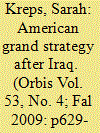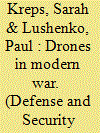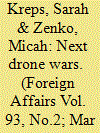| Srl | Item |
| 1 |
ID:
103844


|
|
|
|
|
| Publication |
2009.
|
| Summary/Abstract |
To the extent that a grand strategy can be discerned in the first year of the Obama Administration, its defining features are not a break from the past but continuity. As the President himself has analogized since taking office, crafting grand strategy is like parallel parking. He has only been able to make changes to grand strategy around the margins since a number of existing commitments limit his freedom of action. This article first identifies the structural determinants of grand strategy, pointing to the international distribution of power, American bureaucracy, and public as the key sources of strategic constraint and opportunity. It then shows how shifts in these factors-comparatively less U.S. power, an overstretched military organized around counterinsurgency operations in Iraq and Afghanistan, and an American public weary from an aggressive grand strategy-produced a shift in grand strategy that predated the 2008 election and that remains consistent with the current strategic setting. It is for these reasons that the 2008 "change" election has produced considerable continuity in American grand strategy.
|
|
|
|
|
|
|
|
|
|
|
|
|
|
|
|
| 2 |
ID:
190876


|
|
|
| 3 |
ID:
098248


|
|
|
|
|
| Publication |
2010.
|
| Summary/Abstract |
Despite the increasing popularity of fighting wars through multilateral coalitions, scholars have largely been silent on the question of how public opinion in member states affects alliance cohesion. This article assesses public opinion data for states contributing to operations in Afghanistan. It finds that despite the unpopularity of the war, leaders have largely bucked public opinion and neither reduced nor withdrawn troops from NATO-led operations in Afghanistan. Theoretical expectations about international cooperation and evidence from case studies point to elite consensus as the reason why leaders are not running for the exits in Afghanistan when their publics would prefer that they do. As the article shows, operating through a formal institution such as NATO creates systemic incentives for sustained international cooperation. The result is that elite consensus inoculates leaders from electoral punishment and gives states' commitments to Afghanistan a "stickiness" that defies negative public opinion. A formal alliance such as NATO may therefore create more policy constraints than an ad hoc coalition but also increase the costs of defection and confer a degree of staying power that is unexpected given the adverse public opinion environment.
|
|
|
|
|
|
|
|
|
|
|
|
|
|
|
|
| 4 |
ID:
161600


|
|
|
|
|
| Summary/Abstract |
Humanitarian interventions (HIs) are a common aspect of US foreign policy. Policy makers acknowledge the importance of public support for interventions, but scholars remain divided about the extent and basis of that support. Using a series of survey experiments, we evaluate attitudes about HIs, assess whether the public supports these interventions for instrumental or moral reasons, and test which aspects of morality are most salient. The findings indicate that interventions addressing humanitarian crises boost public support, with the basis of that support residing primarily in normative contentions that the United States has a moral obligation to protect civilians. This research advances understandings of morality in foreign policy, mediates debates about the determinants of public attitudes—including when the public makes moral rather than prudent decisions about interventions—and has important policy implications. It suggests a morally motivated public may be more likely to support risky HIs, increasing the likelihood of using force.
|
|
|
|
|
|
|
|
|
|
|
|
|
|
|
|
| 5 |
ID:
127927


|
|
|
|
|
| Publication |
2014.
|
| Summary/Abstract |
During World War II, a top commander in what was then the U.S. Army Air Forces, General Henry "Hap" Arnold, developed a new way to attack U-boat stations and other heavily fortified German positions: he turned old B-17 and B-24 bombers into remotely piloted aircraft and loaded them with explosives. "If you can get mechanical machines to do this," Arnold wrote in a memo to his staff, "you are saving lives at the outset." The missions had a poor track record, but that did not deter Arnold from declaring in 1945 that "the next war may be fought by airplanes with no men in them at all."
|
|
|
|
|
|
|
|
|
|
|
|
|
|
|
|
| 6 |
ID:
115976


|
|
|
|
|
| Publication |
2012.
|
| Summary/Abstract |
This article examines the methodological and substantive contributions that pragmatism stands to make in the field of international relations (IR) theory. The methodological advantages that pragmatism offers have been described by many scholars in recent years, but the substantive contributions that classical American pragmatists (1870-1930) made to the study of international order have been largely overlooked. It suggests that a careful reading of this philosophical canon, particularly the writings of Charles Sanders Peirce and Josiah Royce, will provide important resources for today's IR theorist.
|
|
|
|
|
|
|
|
|
|
|
|
|
|
|
|
| 7 |
ID:
192030


|
|
|
|
|
| Summary/Abstract |
In “Will the Drone Always Get Through? Offensive Myths and Defensive Realities,” Antonio Calcara et al. examine whether emerging and disruptive technologies, namely unmanned aerial vehicles or drones such as the MQ-9 Reaper and TB-2 Bayraktar, change the offense–defense balance (ODB) in war. Their investigation of “current-generation” and “next-generation” drones—those with greater stealth and autonomy, for instance—nets two overall findings. First, the authors contend that the former “do not yield an offensive advantage against current-generation air defense systems.” Second, the authors “caution against taking for granted that next-generation drones will have an offensive advantage against next-generation air defenses.”Footnote1 This latter finding recognizes that air defense technologies are likely to evolve and compensate for advances in drone technology.
|
|
|
|
|
|
|
|
|
|
|
|
|
|
|
|
| 8 |
ID:
084571


|
|
|